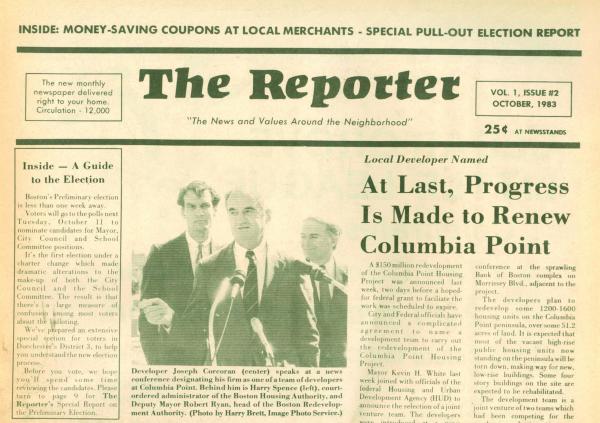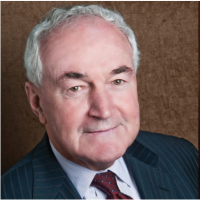June 10, 2020

In 1983 the Reporter featured Joseph Corcoran and his Columbia Point project.

I first met Joe Corcoran in the summer of 1966 when I was working as a letter carrier for the US Post Office. I was delivering mail on Elmer Road, where he lived, and he had posted a lawn sign for his candidacy for political office.
There was a smattering of Corcoran for State Representatives signs on neighboring properties and it looked for sure like he could win and become a Ward 16 legislator. But Joe’s roots were across town—in Uphams Corner, which was, and, is Ward 13. The winner that year was a Ward 16 native, John Finnegan. Joe lost by a handful of votes. And that ended his political career.
In a now-legendary “road not taken” moment, he changed direction and, with two partners, founded a development company, Corcoran, Mullins, Jennison, with the aim of building and providing decent housing. One of CMJ’s early projects was to build senior housing under a program called “turnkey,” in which a private developer would construct housing units and then turn it over to the City of Boston’s housing agency.
Corcoran’s firm built senior housing on Dot Ave in Lower Mills and on Washington Street next to the Dorchester YMCA in Codman Square. He was chairman of the advisory board of the local Y at that time and he engineered the sale to the city of an unused parcel of land owned by the Y to build the much-needed housing. The strategy brought significant revenue to the Y, and new places to live for dozens of seniors.
In 1975, I was interested in publishing a newspaper and learned that a weekly paper in South Boston— the Tribune— was for sale. I sought Joe’s advice.
“How much do they want?” he asked. $25,000, I said.
“What do you get for that? he asked. I said I would get to go into the newspaper business. “Yeah,” he said, “but what else do you get? Do you get receivables? Do you get any property? Is there a lease?”
“What are receivables?” I asked. “And there’s no real estate, and the paper is printed by a third-party.”
Joe said, “Well, if you buy it, what are you really buying?”
I told him I would get the right to call myself the publisher of the South Boston Tribune, and on day one, try to sell enough ads to make a living. I think I was expecting that Joe would say something like “We’ll back you, kid, to do what you want to do.”
But instead, he said this: “You know what, if you’re going spend $25,000 of your own money to publish a newspaper, instead of paying somebody else for just the name, you maybe should take that money and start your own.”
I admit to having been disappointed with that answer, but it probably was the best advice anybody ever extended to me about my long-time hope, my dream, really, of publishing a neighborhood newspaper.
Back then, in the late 1970s, I worked at the former Dorchester Savings Bank and they had several offices in the community. One was a small branch in a moribund retail complex called the Bayside Mall that served the Columbia Point housing project. That small office and a Chinese food takeout place were the only two tenants remaining at Bayside.
Joe used to tell me: “Ed, make sure you never let them close that branch because that’s going to be very valuable property someday. We’re going to re-develop the housing project into something that will be a wonderful venue.”
Joe had a vision for creating mixed income housing and he pioneered it with partners Joe Mullins and Gary Jennison at Columbia Point. It took them years to put together a very complicated development team. But when they did, they turned the peninsula totally around.
Meanwhile, back at the bank, I passed his advice to senior management. The treasurer of the bank was a real swashbuckler who thought he knew much better than Corcoran. I will never forget his final word about reclaiming the housing project: “You tell Joe Corcoran that people like me don’t want to live anywhere near people like them. It will never work, mixing races and mixing incomes in housing.”
That man— the bank treasurer—returned each evening to his home on the South Shore, played golf at the Cohasset Country Club, and mingled with people like himself.
The bank quit its Bayside site a year or two before CMJ struck the bargain to build quality decent housing in the forlorn project. The development, now called Harbor Point, became a national model of successful mixed- income housing.
A couple of years later, the bank failed and our Cohasset-bunkered banker was out of a job.
Joe Corcoran was a visionary who never lost sight of what was good and needed in his business practices, and he developed marvelous housing opportunities across the breadth of Dorchester, from Keystone apartments in Neponset to the Auckland Street apartments on the side of Savin Hill. And, of course, the wonderful Harbor Point complex on Columbia Point. None of those units would be here today were it not for the commitment and the vision of a man named Joseph E. Corcoran.
His long-ago advice that helped steer me to at long last publishing community newspapers came around again two decades ago, when we moved our quarters to the office building he had developed at Bayside.
For the past 20 years, he has been the landlord of the Reporter newspapers. I would sometimes see him on the elevator or in the corridors of the building, and we would stop and chat. Those chance connections always made it a good day for me.
Joe Corcoran passed away last week at his home surrounded by family— his children, grandchildren, and great grandchild. He was a Dorchester original and always committed to his home neighborhood. He did wondrous things for our community.
He is best described as mild-mannered, a true gentle man. And most especially for me, a mentor, an advisor, and a dear friend. He fulfilled the mantra of the Jesuits who taught him at BC High and Boston College to be “A Man for Others.” That’s the way he lived his life, and the way he is. Or sadly, that’s the way he was.
I will miss him dearly.
Ed Forry and his late wife Mary Casey Forry co-founded The Reporter in 1983. Ed continues to work at the Reporter and is the associate publisher.


